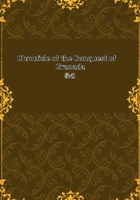
第25章
The severest loss to the Christians in this skirmish was that of Roderigo Tellez Giron, grand master of Calatrava, whose burnished armor, emblazoned with the red cross of his order, made him a mark for the missiles of the enemy. As he was raising his arm to make a blow an arrow pierced him just beneath the shoulder, at the open part of the[1]corselet. The lance and bridle fell from his hands, he faltered in his saddle, and would have fallen to the ground, but was caught by Pedro Gasca, a cavalier of Avila, who conveyed him to his tent, where he died. The king and queen and the whole kingdom mourned his death, for he was in the freshness of his youth, being but twenty-four years of age, and had proved himself a gallant and high-minded cavalier. A melancholy group collected about his[2]corpse on the bloody height of Albohacen: the knights of Calatrava mourned him as a commander; the cavaliers who were encamped on the height lamented him as their companion-in-arms in a service of peril; while the count de Urena grieved over him with the tender affection of a brother.
King Ferdinand now perceived the wisdom of the opinion of the marques of Cadiz, and that his force was quite insufficient for the enterprise. To continue his camp in its present unfortunate position would cost him the lives of his bravest cavaliers, if not a total defeat in case of reinforcements to the enemy. He called a council of war late in the evening of Saturday, and it was determined to withdraw the army early the next morning to Rio Frio, a short distance from the city, and there wait for additional troops from Cordova.
The next morning early the cavaliers on the height of Albohacen began to strike their tents. No sooner did Ali Atar behold this than he sallied forth to attack them. Many of the Christian troops, who had not heard of the intention to change the camp, seeing the tents struck and the Moors sallying forth, supposed that the enemy had been reinforced in the night, and that the army was on the point of retreating. Without stopping to ascertain the truth or to receive orders they fled in dismay, spreading confusion through the camp, nor did they halt until they had reached the Rock of the Lovers, about seven leagues from Loxa.*
*Pulgar, Cronica.
The king and his commanders saw the imminent peril of the moment, and made face to the Moors, each commander guarding his quarter and repelling all assaults while the tents were struck and the artillery and ammunition conveyed away. The king, with a handful of cavaliers, galloped to a rising ground, exposed to the fire of the enemy, calling upon the flying troops and endeavoring in vain to rally them. Setting upon the Moors, he and his cavaliers charged them so vigorously, that they put a squadron to flight, slaying many with their swords and lances and driving others into the river, where they were drowned. The Moors, however, were soon reinforced, and returned in great numbers. The king was in danger of being surrounded, and twice owed his safety to the valor of Don Juan de Ribera, senior of Montemayor.
The marques of Cadiz beheld from a distance the peril of his sovereign. Summoning about seventy horsemen to follow him, he galloped to the spot, threw himself between the king and the enemy, and, hurling his lance, transpierced one of the most daring of the Moors. For some time he remained with no other weapon than his sword; his horse was wounded by an arrow and many of his followers were slain; but he succeeded in beating off the Moors and rescuing the king from imminent jeopardy, whom he then prevailed upon to retire to less dangerous ground.
The marques continued throughout the day to expose himself to the repeated assaults of the enemy: he was ever found in the place of the greatest danger, and through his bravery a great part of the army and camp was preserved from destruction.*
*Cura de los Palacios, c. 58.
It was a perilous day for the commanders, for in a retreat of the kind it is the noblest cavaliers who most expose themselves to save their people. The duke of Medina Celi was struck to the ground, but rescued by his troops. The count de Tendilla, whose tents were nearest to the city, received several wounds, and various other cavaliers of the most distinguished note were exposed to fearful jeopardy. The whole day was passed in bloody skirmishings, in which the hidalgos and cavaliers of the royal household distinguished themselves by their bravery: at length, the encampments being all broken up and most of the artillery and baggage removed, the bloody height of Albohacen was abandoned and the neighborhood of Loxa evacuated. Several tents, a quantity of provisions, and a few pieces of artillery were left upon the spot from the want of horses and mules to carry them off.
Ali Atar hung upon the rear of the retiring army, and harassed it until it reached Rio Frio; Ferdinand returned thence to Cordova, deeply mortified, though greatly benefited, by the severe lesson he had received, which served to render him more cautious in his campaigns and more diffident of fortune. He sent letters to all parts excusing his retreat, imputing it to the small number of his forces, and the circumstance that many of them were quotas sent from various cities, and not in royal pay; in the mean time, to console his troops for their disappointment and to keep up their spirits, he led them upon another inroad to lay waste the Vega of Granada.